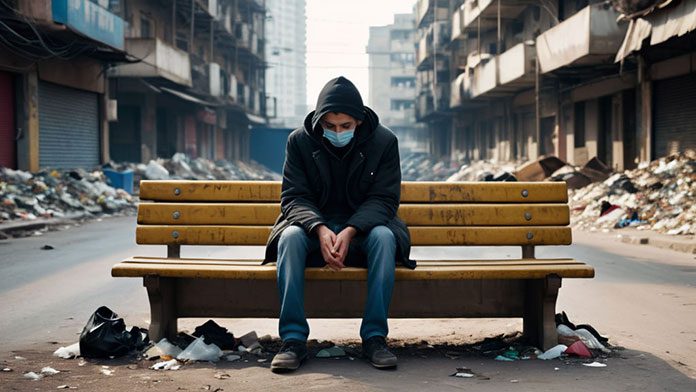Looking for ways to understand the impact of poverty on mental health? Curious about how economic stress, limited access to healthcare, and other factors can affect your well-being? You’re in the right place.
In this article, we’ll explore five key ways that poverty can influence mental health. From increased rates of depression and anxiety to the impact on childhood development, we’ll delve into the important connections between poverty and mental well-being.
So, let’s dive in and gain a deeper understanding together.
Table of Contents

Related Video: "The impact of poverty on mental health" by Re: News
Main Points
– Living in poverty creates constant stress and worry about meeting basic needs, leading to anxiety, depression, and hopelessness.
– Limited access to healthcare services, including mental healthcare, delays or prevents adequate treatment and preventative care.
– Limited access to healthcare services increases the risk of substance abuse as individuals may self-medicate to cope with the stress of poverty.
– Poverty is associated with higher rates of depression and anxiety due to limited access to mental health resources, chronic stress, social isolation, and stigma.
Economic Stress and Mental Health

In the article, let’s explore how economic stress affects your mental health.
It’s important to understand how poverty affects mental health because it can have a significant impact on your overall well-being. Living in poverty can create a constant state of stress and worry about meeting basic needs such as food, shelter, and healthcare. This chronic economic stress can lead to feelings of anxiety, depression, and hopelessness.
When you’re struggling to make ends meet, it can be difficult to focus on anything other than your financial situation. The constant pressure to find a job or pay bills can consume your thoughts and leave little mental space for self-care or personal growth. This can lead to a decrease in motivation and a sense of helplessness.
Furthermore, the lack of financial resources can limit your access to mental healthcare services. Without the means to seek professional help, you may be left to navigate your mental health challenges on your own. This can exacerbate existing mental health issues or prevent you from receiving the support you need.
Additionally, the stress of poverty can impact your relationships and social support networks. Financial strain can strain relationships with loved ones, causing conflict and further isolation. The shame and stigma associated with poverty can also make it difficult to reach out for help or connect with others who may be experiencing similar challenges.
Limited Access to Healthcare Services

When facing economic stress and living in poverty, you often have limited access to necessary healthcare services, exacerbating the already challenging effects on your mental health. The lack of proper healthcare can have a profound impact on your well-being, making it difficult to address and manage mental health issues effectively. Here are three ways limited access to healthcare services can further compound the effects of poverty on your mental health:
– Delayed or inadequate treatment: Due to financial constraints, you may not be able to seek timely medical attention or afford comprehensive treatment options. This delay in receiving proper care can worsen your mental health conditions and lead to a prolonged struggle with managing your symptoms.
– Limited access to mental health professionals: Poverty often limits your ability to access mental health professionals, such as psychiatrists, psychologists, and therapists. The scarcity of these resources can make it challenging to receive specialized care and support, leaving you feeling isolated and overwhelmed.
– Inadequate preventative care: Regular check-ups and preventative care play a crucial role in maintaining good mental health. However, limited access to healthcare services can prevent you from receiving essential screenings, vaccinations, and early intervention, increasing the risk of developing or exacerbating mental health issues.
It is crucial to address the issue of limited access to healthcare services in order to break the cycle of poverty and improve mental health outcomes for those living in poverty. Efforts should be made to increase access, affordability, and availability of healthcare services for economically disadvantaged individuals, ensuring that everyone has the opportunity to receive the care they need to thrive mentally and physically.
Increased Risk of Substance Abuse
Limited access to healthcare services can contribute to an increased risk of substance abuse, further compounding the effects of poverty on your mental health. When you’re struggling to make ends meet, it can be challenging to prioritize your healthcare needs. Unfortunately, this means that seeking help for substance abuse issues may fall by the wayside. Without proper support and treatment, the risk of developing a substance abuse problem becomes even greater.
Poverty can create a vicious cycle where mental health issues are left untreated, leading to self-medication with drugs or alcohol. The stress and strain of living in poverty can take a toll on your mental well-being, making it tempting to turn to substances as a way to cope. Substance abuse may provide temporary relief, but it ultimately exacerbates the underlying mental health issues and perpetuates the cycle of poverty.
Furthermore, poverty often restricts access to quality education and employment opportunities. This lack of resources can leave individuals feeling hopeless and trapped, increasing the likelihood of engaging in substance abuse. In addition, the social isolation that poverty often brings can further contribute to substance abuse as individuals seek solace in drugs or alcohol.
It’s important to recognize that substance abuse isn’t a personal failing, but rather a complex issue influenced by various factors, including poverty. If you find yourself struggling with substance abuse, remember that help is available. Reach out to support groups, community organizations, or healthcare professionals who can provide the assistance you need to overcome these challenges. Remember, you aren’t alone, and there’s hope for a brighter future.
Higher Rates of Depression and Anxiety
Experiencing poverty can significantly increase your risk of developing higher rates of depression and anxiety. Living in poverty comes with a myriad of challenges that can take a toll on your mental well-being. Here are three key reasons why poverty can contribute to higher rates of depression and anxiety:
– Limited access to resources: Poverty often means limited access to mental health services, medication, and therapy. Without proper support and treatment options, individuals living in poverty may struggle to manage their mental health effectively, leading to higher rates of depression and anxiety.
– Chronic stress: Poverty is accompanied by constant financial strain, insecurity, and uncertainty about the future. These chronic stressors can trigger and exacerbate symptoms of depression and anxiety, making it harder to cope with daily life challenges.
– Social isolation and stigma: Poverty can lead to social isolation and feelings of shame or stigma. This sense of isolation and societal judgment can further contribute to feelings of depression and anxiety, as individuals may lack a support system and fear being judged or misunderstood.
Understanding the link between poverty and mental health is crucial in order to address the needs of individuals living in poverty and provide them with the support and resources necessary to improve their mental well-being.
Impact on Childhood Development and Mental Well-Being
Living in poverty can have a significant impact on the development and mental well-being of children. Growing up in poverty means facing numerous challenges that can hinder a child’s overall growth and emotional stability. Limited access to quality education, proper nutrition, and healthcare services can all contribute to developmental delays and increased risk of mental health issues.
Children living in poverty often lack the resources needed to support their cognitive and emotional development. They may not have access to early childhood education programs or enriching activities that stimulate their learning and creativity. This can result in slower language acquisition, decreased problem-solving skills, and difficulties in expressing emotions.
Furthermore, the stress and instability that poverty brings can have a profound effect on a child’s mental well-being. Constantly worrying about basic needs like food, shelter, and safety can lead to chronic stress, anxiety, and even depression. The lack of stability and predictability in their environment can disrupt their emotional regulation and social interactions, making it harder for them to form healthy relationships and cope with adversity.
It is crucial to recognize the impact of poverty on childhood development and mental health. By providing comprehensive support systems, including access to quality education, healthcare, and social services, we can help mitigate the negative effects of poverty and give every child the opportunity to thrive.
Frequently Asked Questions
How Does Poverty Specifically Impact the Mental Health of Individuals Experiencing Economic Stress?
Poverty can have a significant impact on your mental health. The stress of economic struggles can lead to anxiety and depression. It can also limit access to resources needed for proper mental healthcare.
What Are the Main Barriers Individuals in Poverty Face When Trying to Access Healthcare Services for Mental Health Treatment?
When you're in poverty, accessing healthcare for mental health treatment can be challenging. Barriers like lack of insurance, limited transportation, and high costs make it difficult to get the help you need.
How Does Poverty Contribute to an Increased Risk of Substance Abuse Among Individuals?
Poverty increases your risk of substance abuse by limiting access to resources and support systems. Financial stress and lack of opportunities can lead to self-medication and escape through drugs or alcohol.


